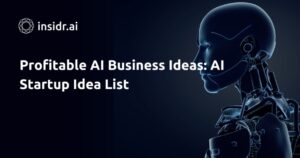AI-Enabled Marketing: The Future of Growing Your Business
AI Marketing is one such tool that can help take your business to the next level by leveraging advanced algorithms and data analysis to drive growth.
In this blog post, we will explore what AI Marketing is, its benefits for businesses, challenges in implementation, and strategies for success.
What is AI-Enabled Marketing?
AI Marketing is the use of artificial intelligence tools to grow businesses by predicting consumer behaviour and offering personalized experiences.
With AI, marketers can analyze vast amounts of data and gain insights into customer preferences, helping them create targeted campaigns that increase engagement and drive conversions.
This technology is revolutionizing the marketing industry by enabling more efficient and effective advertising strategies that deliver results.
Defining AI Marketing
Understanding the basics of Artificial Intelligence (AI) is essential to defining AI Marketing. AI refers to the ability of machines to perform tasks that typically require human intelligence, including learning, reasoning, and problem-solving. The role of AI in marketing has become increasingly important as businesses seek tools and technologies that can help them grow.
Examples of how AI is being used in marketing today include personalized advertising campaigns based on user data analysis; chatbots that provide customer support and assistance; and predictive analytics for identifying new market opportunities or optimizing pricing strategies. By leveraging these capabilities, businesses can gain a competitive edge in today’s ever-evolving marketplace.
The Evolution of AI in Marketing
Early uses of data-driven marketing paved the way for AI in marketing, as businesses sought to optimize their campaigns using customer information and insights. With advancements in technology, machine learning and predictive analytics have become powerful tools to help marketers better understand their audience and improve targeting efforts.
As AI continues to evolve, emerging trends such as personalized content delivery and chatbots are becoming increasingly prevalent in the industry. The possibilities for AI in marketing are virtually limitless; from hyper-targeted messaging to real-time decision-making, there is no doubt that this technology will continue to revolutionize the way businesses reach customers and grow their brand presence.
How AI Marketing Can Grow Your Business
Using AI marketing can revolutionize your business, allowing you to personalize at scale and connect with customers in a more meaningful way. With sophisticated algorithms and machine learning capabilities, AI marketing can analyze data from multiple channels to provide insights that allow companies to engage with customers on a deeper level. By providing tailored experiences, businesses will see an increase in customer loyalty and ultimately drive revenue growth.
AI marketing also allows for improved customer experience by predicting the behaviour patterns and preferences of individual consumers. This enables companies to create targeted campaigns that are relevant, timely, and personalized. As a result, this improves the overall satisfaction of the end user while increasing the likelihood of repeat purchases or recommendations to others. The future lies in those who embrace these tools as they have proven highly effective when applied correctly within any business model.
Personalization at Scale
Personalization at scale is becoming increasingly important in the world of AI marketing. Predictive analytics, dynamic pricing, and automated chatbots are powerful tools that enable businesses to deliver personalized experiences to their customers.
- Predictive analytics allows businesses to segment consumers based on their behaviour and interests, making it easier to target them with relevant messaging.
- Dynamic pricing allows for real-time adjustments based on demand and customer behaviour.
- Automated chatbots can provide instant support tailored to each individual’s needs, improving customer satisfaction.
With these tools in hand, businesses can create a more engaging experience for customers while also improving efficiency by automating processes that would otherwise require human intervention. The end result is a win-win situation where both the business and its customers benefit from this personalization at-scale approach.
Improved Customer Experience
Real-time data analysis is revolutionizing website and app design, allowing businesses to tailor their digital platforms to meet the specific needs and preferences of each customer. By harnessing the power of AI technology, brands can now leverage real-time data insights to optimize user experience, providing a seamless journey from start to finish. Whether it’s customizing product recommendations or tailoring landing pages based on browsing history, this approach ensures that every interaction feels personal and relevant.
In addition to optimizing digital touchpoints, AI-powered voice assistants are transforming customer service by offering 24/7 support that’s always available when customers need it most. With natural language processing capabilities that enable intuitive communication, these virtual agents offer quick resolutions while freeing up staff for more complex inquiries. Automated email campaigns tailored to individual preferences also play a crucial role in improving customer experience by delivering personalized content at the right time and frequency. From abandoned cart reminders to exclusive offers based on past purchases, automated emails help keep customers engaged throughout their entire journey with your brand.
Increased Efficiency and Cost Savings
Streamlined ad targeting through AI-powered bidding strategies, ‘smart’ inventory management systems using predictive demand forecasting, and AI-driven fraud detection software are just a few ways that businesses can increase efficiency and cost savings through the use of AI in their marketing efforts. By leveraging these technologies, companies can optimise their operations, reduce costs associated with fraudulent transactions and errors caused by human oversight while providing better products or services to customers.
Here are some examples of how AI is driving increased efficiency and cost savings in marketing:
- Streamlined ad targeting: Using machine learning algorithms to automate bid optimization allows for targeted advertising that maximizes return on investment
- Predictive demand forecasting: Anticipating customer needs based on historical data helps businesses make more accurate predictions about future sales volumes reducing overstocking or understocking issues.
- Fraud detection: Machine learning-based systems help identify fraudulent transactions quickly so they can be stopped before too much damage is done.
The bottom line is clear – adopting AI-powered technologies leads to higher ROI, lower operating costs, and improved accuracy while also ensuring a better customer experience.
The Challenges of AI Marketing
As AI marketing becomes more widespread, businesses face a number of challenges in utilizing it effectively. One major concern is data privacy and security, as the use of AI technology requires vast amounts of personal information to be collected and processed. Companies must take measures to protect this data and ensure that they are complying with relevant regulations.
Another challenge is the need for skilled professionals who can develop and implement effective AI marketing strategies. As the use of AI continues to expand, there will be increased demand for individuals with expertise in areas such as machine learning, natural language processing, and data analysis. Businesses must invest in training their employees or hiring new talent with these skills in order to stay competitive in an increasingly digital marketplace.
Data Privacy and Security Concerns
As AI marketing becomes more prevalent, businesses must consider ethical considerations in using customer data. It’s essential to ensure that all collection and usage of data align with the company’s values and respect customers’ privacy rights. Additionally, companies must remain vigilant in ensuring compliance with data protection laws to avoid any legal consequences from mishandling sensitive information.
Implementing security measures is also crucial for preventing cyber attacks on marketing AI systems. Regularly updating security protocols can prevent malicious actors from accessing customer data or damaging the system’s functionality. Companies should invest time and resources into training employees on how to identify potential threats and take appropriate action promptly.
Overall, maintaining high standards for data privacy and security is critical for successfully implementing AI marketing strategies while earning customers’ trust over time.
The Need for Skilled Professionals
To effectively leverage AI in marketing, it’s crucial to develop a comprehensive understanding of the technology. Hiring professionals with expertise in machine learning and data analysis is necessary to stay ahead of the competition. However, providing ongoing training is equally important given how rapidly the field of AI evolves.
With an increasing reliance on data-driven decision-making across industries, developing a skilled workforce capable of handling complex tasks related to marketing AI has become imperative for businesses. This means hiring individuals who have deep expertise in machine learning algorithms and statistical modelling techniques as well as possessing soft skills like communication and collaboration required for working within cross-functional teams. To keep up with evolving demands, organizations must also invest resources into ongoing training programs that equip their employees with new tools and techniques needed for staying at the cutting edge of this exciting field.
Implementing AI Marketing Strategies
AI marketing strategies are revolutionizing the way companies grow their business. By leveraging AI technology, companies can analyze vast amounts of data to identify trends and patterns that would have been impossible for humans to detect. This allows businesses to make more informed decisions about which marketing strategies will be most effective in reaching their target audience.
To implement successful AI marketing strategies, it’s important to choose the right tools and integrate them with human expertise. It’s not enough to simply rely on AI algorithms without any input from experienced marketers who understand your specific business needs. The key is finding a balance between human creativity and technological efficiency, so you can develop personalized campaigns that resonate with your target audience while maximizing ROI.
Assessing Your Business Needs
Identifying marketing goals and objectives is crucial to the success of any business. With the help of AI, businesses can gain a deeper understanding of their customers’ behaviour and preferences, allowing them to tailor their marketing efforts accordingly. Analyzing available data can further aid in identifying areas for improvement and optimizing marketing campaigns for better results.
Determining the target audience and their behaviour is also essential in ensuring effective communication with potential customers. AI technology allows businesses to analyze vast amounts of data quickly, providing insights into consumer behaviour that would be impossible otherwise. By utilizing this information, companies can create more targeted advertising campaigns that resonate with their desired audience, resulting in increased engagement and sales.
Choosing the Right AI Marketing Tools
When it comes to choosing the right AI marketing tools, thorough research is key. Take time to explore various platforms and vendors in order to evaluate their features and determine which ones align with your business needs. Look for tools that offer natural language processing, image recognition, and other advanced capabilities.
Another important factor when selecting an AI marketing tool is pricing. Comparing different plans can help you find a cost-effective solution that will give you the most value for your investment. Ultimately, by taking these steps to carefully choose the right tool or platform for your business, you can harness the power of artificial intelligence to enhance your marketing strategies and drive growth.
Integrating AI with Human Expertise
Building a team of experts in both marketing and technology is crucial for the successful integration of AI with human expertise. Experts should possess essential skills such as data analysis, programming, and marketing knowledge to ensure maximum utilization of AI tools. Clear communication channels between human experts and AI tools must also be established to avoid any misinterpretation or duplication of work.
Maintaining flexibility in adapting to changes brought about by implementing AI strategies cannot be overemphasized. As businesses grow, the needs change; therefore, it’s important that the teams remain agile enough to adapt quickly while leveraging the benefits provided by integrating artificial intelligence into their operations.
Key points:
- Building a diverse team
- Creating clear communication channels
- Maintaining flexibility in adapting to changes
Closing
AI marketing has become an essential tool for businesses to grow and expand their reach. With its ability to analyze consumer behaviour patterns and personalize marketing strategies, it enables companies to develop effective campaigns that resonate with their target audience. As technology continues to advance and become more accessible, we can expect even more significant changes in how businesses approach marketing.
Overall, investing in AI marketing is a wise decision for any company looking to stay competitive in today’s digital age.
By harnessing the power of machine learning algorithms and data analytics, businesses can gain valuable insights into customer preferences while delivering highly relevant content at each stage of the customer journey.
The future is bright for those who embrace this cutting-edge technology in their marketing efforts.

















